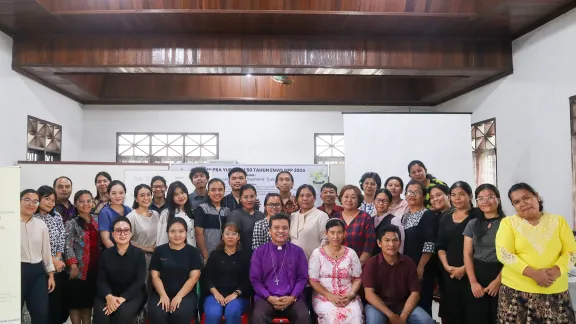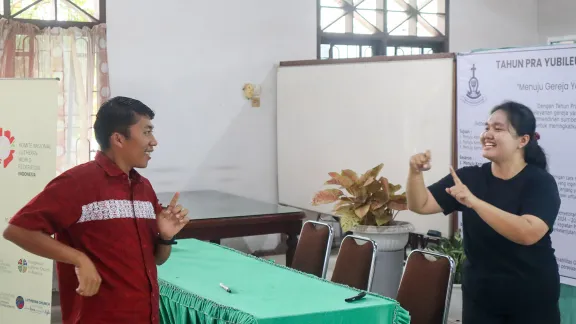Taking a step towards building an inclusive church, LWF member churches in Indonesia conducted a workshop that included basic training for church staff in Indonesian sign language.

Participants and lecturers of the workshop on creating an inclusive church welcoming people with disabilities, particularly the deaf. Photo: KN-LWF
Training church staff in Indonesian sign language
(LWI) – The Indonesian National Committee of the Lutheran World Federation (KN-LWF) recently organized a workshop in collaboration with The United Protestant Church (GPP) to create and promote a worship environment accommodating people with disabilities, especially the deaf. The workshop included basic training for church staff in Indonesian sign language.
Opening the workshop, KN-LWF Director Rev. Dedi Pardosi underlined the importance of effective communication in daily life. He noted that not all community members can communicate in the same way. “Sign language can be a powerful bridge in strengthening communication and engagement for individuals with hearing loss,” Pardosi said.
GPP Bishop Makmur Simaremare welcomed the training, saying it would help church staff “spread the word of God to deaf friends.”
Rev. Masriany Sihite introduced participants to the theology of disability. She said disabled people are “members of the body of Christ,” requiring inclusive environments and systems.
Disability theology can be defined as the attempt by disabled and non-disabled Christians to understand and interpret the gospel of Jesus Christ, God, and humanity against the backdrop of the historical and contemporary experiences of people with disabilities.
Theological perspectives and practical approaches to an inclusive church
Elisabeth from the Movement for the Welfare of the Deaf Indonesia (GERKATIN), who is deaf herself, encouraged participants to use the term tuli (deaf) instead of tuna rungu (hearing impaired) when referring to individuals with hearing impairments. This shift in terminology promotes a more positive social identity and fosters a culture of inclusivity in the Indonesian context.

Practicing sign language can be fun! Photo: KN-LWF
Vutry Simarmata is a Juru Bahasa Isyarat professional who facilitates communication between individuals using sign language, especially individuals with hearing impairments and those who do not understand sign language. She taught participants the basics of Indonesian sign language, featuring the glossary, alphabet, hand-use, and gesture methods in sign language.
KN-LWF and GPP saw this training as a “meaningful first step in the journey towards equality and justice for all members of the congregation and building an inclusive church.”
At its Thirteenth Assembly in 2023, The Lutheran World Federation (LWF) adopted a Resolution on Inclusivity and Participation that calls for “the development of accessible liturgical resources, such as music and prayers, as well as other resources. This inclusive approach should incorporate sign language interpreters, Braille materials, assistive technologies where needed, and any other necessary approaches for full and active participation”.


